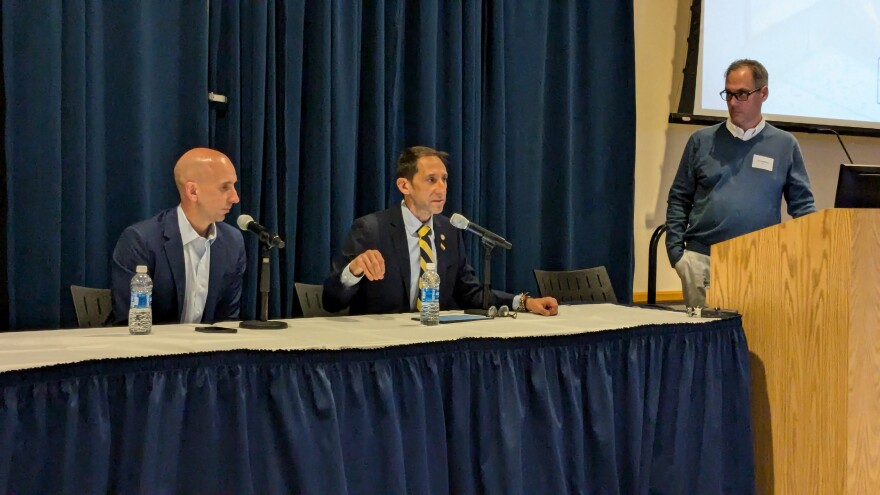UPPER SAUCON TWP., Pa. — Mayors from two of the Lehigh Valley’s three cities shared strategies for addressing homelessness Wednesday in a panel at DeSales University Wednesday.
Allentown mayor Matt Tuerk and Bethlehem mayor J. William Reynolds spoke in the discussion, part of the Lehigh Conference of Churches’ programming for Hunger and Homelessness Awareness Week.
Though Easton mayor Sal Panto was scheduled to join the panel, he did not appear.
Above all else, the two mayors emphasized the importance of collaboration to make progress in reducing homelessness — between the cities and nonprofit groups that deliver front-line services, but also among all of the Lehigh Valley’s municipalities.
“We really do need our partners to help us, and not just because more hands make lighter work, but because we need the creativity," Tuerk said. "We need the perspective of people who have lived experiences in dealing with these challenges."
Collaboration works best when officials build those relationships before they are actually needed, Reynolds said. With partnerships in place, everyone can work on making response plans, making connections and developing projects before any of them are actually needed.
This way, when emergencies arise, the people and relationships needed to manage it are already in place. When grant money becomes available, someone has a project ready to submit.
“If you want to solve the problem and not move the problem, you need to have everybody on board. And right now we don't.”
Reynolds said that while the Valley’s three cities are working together well to tackle homelessness, smaller, less urban municipalities need to take a greater stake in the issue.
“Right now, the problem is not owned by all 62 municipalities. It's owned by a few municipalities,” he said. “If you want to solve the problem and not move the problem, you need to have everybody on board. And right now we don't.”
Most of the land available for development lies outside Allentown, Bethlehem and Easton, said Reynolds, so it’s the townships and boroughs that will need to assess what they can do to add new housing.
‘Concrete solutions’
Both mayors agreed that the ultimate solution to the Valley’s housing woes is to build more housing at every price point.
Though both cities have worked to encourage new development — Tuerk and Reyolds each supported amending their city’s zoning codes to allow more density — economic forces will decide what is built where.
“None of us are as powerful as the market is,” Reynolds said, and officials can only work within the existing market to make development more attractive.
Both cities have recently launched studies aimed at identifying more solutions. Bethlehem officials shared the results of their research in 2022; results of Allentown’s study will be released in the coming weeks, Tuerk said.
Working from Bethlehem’s study, city officials and consultants devised a strategic plan to address homelessness centered on building a new year-round emergency shelter.
There are no silver bullets when it comes to reducing homelessness.
“There’s not a lot of home runs in this game," Reynolds said. "There’s a lot of singles."
For example, Allentown has launched mapping tools for first responders that share the location of encampments and safe ways to access them, Tuerk said. As a result, fire crews and EMS workers can more quickly respond to emergency calls.
While both cities are also working on making more mental health resources available, Reynolds warned that mental health resources are not a replacement for addressing access to housing.
Centering mental health resources as a solution to homelessness “is almost like relieving people's responsibility to be a part of the other systemic solutions, like finding people housing or paying for it,” he said.
Paradoxically, Reynolds pointed to the severity of the Lehigh Valley’s housing crisis as a reason for hope that it will be resolved.
“It's affecting more and more middle-class and upper-middle-class people who look at their kids like, ‘my kid can't find a place to live,’” he said. “It's leading to more and more political pressure to be able to do something about this.”


